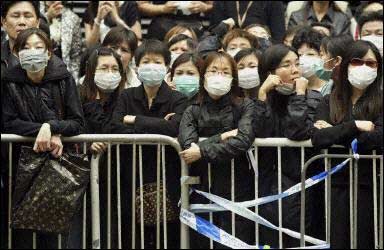 [Originally published in Moocat.]
[Originally published in Moocat.]
On this earth there’s a kind of bird without legs.
It must keep flying all its life.
The only time it touches the ground
is when it dies.
— Days of Being Wild (1990)
Hong Kong: April 8, 2003
They come from mainland China, Taiwan, Japan, Singapore. Fifty at a time, they enter the funeral home, pay silent last respects, white ribbons strapped about their arms. Teen girls, pudgy matrons, men in silk suits. Many hide noses and mouths behind cloth masks, for this is the SARS Age. Outside, those who patiently wait their turn are caught in the encompassing gloom of a spring shower. Eyes are rubbed red with tears, heavy with pent-up sorrow. They clutch signs: pleadings of Why? and avowals of Deepest Sympathy, Miss You Forever, a Star Forever. The word forever has a particular force today. Youth is forever, beauty is forever. You were both, and yet you are gone. For a city wracked by disease, mired in an economic slump, staring down cultural irrelevance, this is the final swan dive.
And yet, royalty is on the scene. The guest list of friends is a roll call of once and future Hong Kong cinema. Chow Yun-Fat. Tony Leung. Stephen Chow. Carina Lau. Anthony Wong. Anita Yuen. Jacky Cheung. And of course Anita Mui, the Far East’s answer to Madonna, someone who knows a thing or two about the diva life, your best friend, all but stricken with grief. So many beautiful faces from indelible films.
You specialized in living and dying glamorously onscreen. You prided yourself on perfect takes and dramatic exits. You would not have been displeased. No movie star farewell has ever been quite like this, this horribly beautiful apotheosis of tragedy and the passing of history.
* * *
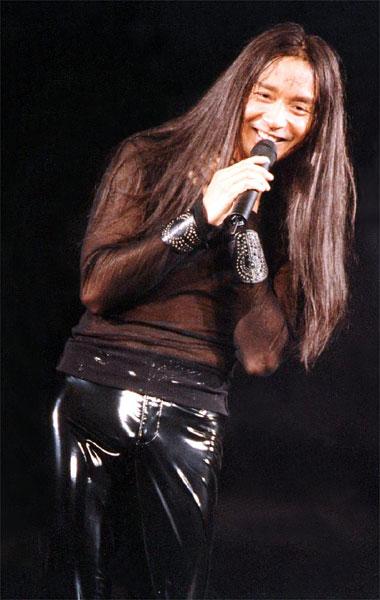 Good moments are unreal like dreams
Good moments are unreal like dreams
Who understands the joy of life?
I say it is still right to pursue love
— “Chase,” from She’s a Man, He’s a Woman (1994)
Toronto, The “Passion” Tour, Christmas 2000
Tonight is the same as many nights: The twinkle of laser lights, your arms thrust to the heavenly spotlights, your dancers matching your every move, so desperately wanting to be you. You sail through myriad costume changes, waist-low wigs, Jean Paul Gaultier dresses, navel-baring tanktops, all part of the big tease calculated to whip up the fans. In Hong Kong’s feminized pop realm of sequins, floppy shirts, and Vegas choreography, you are the one authentic female.
You have been bestowed the honorific nickname Gor Gor (big brother), but remain perpetually youthful at age 43 – still the baby cheeks, the whiplike brows, the waist of a girl, the moony eyes that go from self-satisfied to tormented in no time flat. And of course those nervous, abashed smiles, so rare and therefore so precious, the overbite and slightly crooked teeth reminding us that you are indeed human, and all the more lovable for it.
Your name redolent of tragic heroes (stolen from Gone with the Wind’s Leslie Howard), you are the last diva. Like the best of them, you are magnetic: needy and removed, welcoming and dismissive. In Hong Kong’s hyperstylized universe of music and cinema, you are the ultimate hyperstylist, a compilation of James Dean, Sinatra, and Hedwig. Most importantly, even as throaty women scream, you cultivate the enigma of Leslie – Are you straight? Gay? Somewhere in between? Sometimes you politely deflect the question with that smile, and at others you wave it off brusquely. Attract and repel. Any show-biz legend worth her salt knows: Leave them hanging, wanting more.
You are not a great vocalist, but the swoon and croon are your secret weapons, and you have the gift of interpretation. Pre-fab Canto ballads become suave paeans to love; chestnuts such as “A Thousand Dreams of You” and “White Christmas” are stoked to a fine glow. Asian audiences do not dance, even in Toronto, but they shimmy and shake for you.
“I love you, Leslie!” someone shrieks.
Your reply: “I love you too, whether you’re a boy or a girl.”
* * *
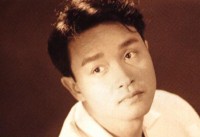 “Did you see me in your dreams last night?”
“Did you see me in your dreams last night?”
“No, I didn’t.”
“Of course. You couldn’t sleep at all.”
— Days of Being Wild (1990)
1986: “A Better Tomorrow”
It was a struggle early on: Hong Kong cinema, with its overemphatic joys, the drawn-out slapstick and action, had no clue what to do with you. Chow Yun-Fat could add flair and dramatic weight to even the lowliest routines, but you were a hot house flower, wilting into the scenery when gunfights and urine jokes took over.
But then came, of all people, director John “God of Bullets” Woo and A Better Tomorrow. In the space of 94 minutes, you grow up before our eyes. At film’s beginning, you are the gawky kid brother, the fresh-faced cop, and then comes the revelation: the older brother you idolize is a gangster. Pouty with righteousness, you scream at him: “Don’t address me by my name! You call me ‘Sir’!” Never before or since has Woo forged such a perfect homoerotic triangle. In the center, your tormented older brother; in the far corner, Chow Yun-Fat as his hitman buddy, machismo and virility defined; and in this corner, you, as the counterbalance of sisterly conscience. And what a finale, as Chow embraces you just as his brains are blown out, and blood rains on your face. What a face, languid with exhaustion and moral defeat, and still so pretty, so hopeful. The boy has traded in his unbearable lightness; the man has emerged.
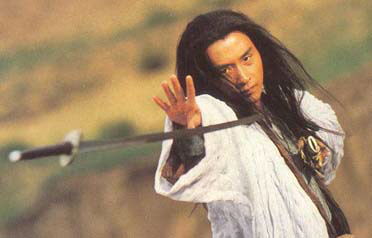 You function best in historical dramas and comedies, for something about you harkens to a different age – the petite frame, the soft voice, the theatrical sighs, the well-timed thunderbolts of intensity. You hit stride with classic period kung fu comedies (A Chinese Ghost Story (1987)) and classic ghost stories (Rouge (1988)). The latter is a dress rehearsal for the immortal Farewell My Concubine (1993), with its evocation of the decadent ’30s, the lives of spoiled young Masters and courtesans, the allure of doomed love. Caught in an opium haze, your delicate features heightened with Peking Opera paint, you clutch your lover to your bosom, the sensualist as artist. For local audiences, this is alien territory, a rocket back to the brittle snowflake days of vintage Chinese dramas – but with a postmodern twist, as the ghosts of tragic heroines past have been reincarnated in you, the pansexual Peter Pan.
You function best in historical dramas and comedies, for something about you harkens to a different age – the petite frame, the soft voice, the theatrical sighs, the well-timed thunderbolts of intensity. You hit stride with classic period kung fu comedies (A Chinese Ghost Story (1987)) and classic ghost stories (Rouge (1988)). The latter is a dress rehearsal for the immortal Farewell My Concubine (1993), with its evocation of the decadent ’30s, the lives of spoiled young Masters and courtesans, the allure of doomed love. Caught in an opium haze, your delicate features heightened with Peking Opera paint, you clutch your lover to your bosom, the sensualist as artist. For local audiences, this is alien territory, a rocket back to the brittle snowflake days of vintage Chinese dramas – but with a postmodern twist, as the ghosts of tragic heroines past have been reincarnated in you, the pansexual Peter Pan.
* * *
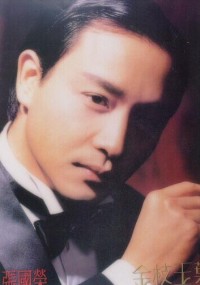 Don’t mention the past anymore — there’s already too many storms in life
Don’t mention the past anymore — there’s already too many storms in life
Memories can’t be wiped away — love and hate are still in the heart
I must cut myself from the past, and let tomorrow go on
So stop trying so hard to find out where I am
Love is a difficult question, it makes one dizzy and mesmerized
Forgetting the pain is possible, but forgetting you — that’s too hard
— “When Love Is Gone” from Farewell My Concubine (1993)
The smooth-talking playboy cha-cha-chas before a full-length mirror with the aplomb of Travolta, fully aware of his magnificence, yet so offhand about it, like the puff of cigarette smoke he tosses out. Roaming the neon streets of swinging sixties Hong Kong, he loves them and leaves them, catty prostitute and good-hearted girl alike. Elusive, wounded, irresistible, he is paragon and paradigm, little boy lost from a lost era, swinging with easy samba rhythm but forever pining for a mother he never knew. This is Ah-Fei, the star of Wong Kar Wai’s Days of Being Wild (1990). Your masterpiece. You are Ah-Fei and Ah-Fei is you. By now your reputation has already been cemented: everyone recognizes you as the temperamental artiste, the perfectionist, the man who stalks the roads of what the Japanese call the Floating World — the domain where art and transience and death collide — without a glimmer of hesitation. And roads inevitably trail off to beautiful endings: mortally wounded, Ah-Fei rides a train deep into the Philippine jungle, straight to the lush Heart of Darkness, rootless and unrepentant, his hair artfully swept over his brow as he smiles his final pained smile.
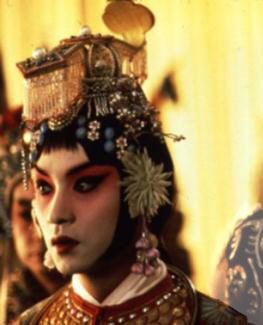 Not far behind is international acclaim with Farewell My Concubine — not so much your best performance as your most quintessential, running from haughty to outraged to devastated to redeemed, the chronicle of a beautiful life in an ugly time. You are not one for naturalism. You revel in outsize gestures and quiet charisma, you know when to play it as soft as a stage whisper or emote to the rafters. In the role of a temperamental gay Peking Opera singer suffering through a century’s upheaval, you finally come upon a canvas both broad and intimate enough to support you. Writhing in the throes of opium addiction, gazing sadly from behind thick-rimmed glasses, throwing on a cloak like the Belle of the Ball — the rest is history.
Not far behind is international acclaim with Farewell My Concubine — not so much your best performance as your most quintessential, running from haughty to outraged to devastated to redeemed, the chronicle of a beautiful life in an ugly time. You are not one for naturalism. You revel in outsize gestures and quiet charisma, you know when to play it as soft as a stage whisper or emote to the rafters. In the role of a temperamental gay Peking Opera singer suffering through a century’s upheaval, you finally come upon a canvas both broad and intimate enough to support you. Writhing in the throes of opium addiction, gazing sadly from behind thick-rimmed glasses, throwing on a cloak like the Belle of the Ball — the rest is history.
You have moved past Hong Kong, into the arms of the world. With Concubine’s fame comes fresh gossip: tales of nervous breakdowns, of seeing “ghosts,” of dark depression, of moving to Vancouver, of retiring from the music business permanently. Still you soldier on, ever playing the sophisticate, charming and bratty. Jackie Chan may be pegged as Hong Kong’s good-natured ambassador to the world, Chow Yun-Fat the new action king, but you are Hong Kong’s dark prince, its Phantom of the Opera.
* * *
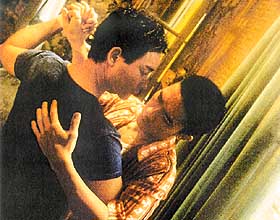 Without love, even sleeping is pointless
Without love, even sleeping is pointless
Forget love, and there is no point to loving
I get frustrated because of you,
And it lets me know that to continue adoring is better than ending
Understanding how to be excited,
I know that a painful heart is better than a relaxed heart
“Without Love,” from Okinawa Rendezvous (2000)
How to follow up on Farewell My Concubine, Days of Being Wild and the rest? The easy answer: it is impossible. The Phantom Lover (1995) shoulda been a contender: Leslie as a Chinese Phantom of the Opera, a can’t-miss scenario! Alas, you are dwarfed by ornate production design and faulty chemistry with leading lady Wu Chien-Lien (Eat, Drink, Man, Woman). Temptress Moon (1996) is another grand blunder. You are reunited with Concubine director Chen Kaige and star Gong Li in a winning formula: once again you are the youthful Lothario in a faraway time – in this case, 1930s Shanghai – tripped up by love and its slimy secrets. Preening one moment and anguished the next, you bravely push your performance to the edge of parody, but the film itself is wobbly, oblique, overdone.
Yet there is still a final gasp: 1997’s Happy Together, your last truly essential film, another collaboration with Wong Kar-Wai. The funhouse mirror image of Days of Being Wild, it abandons nostalgia for jet lag as you flit between modern-day Argentina, Hong Kong, and Taiwan. Where your Ah-Fei was purposeful, languid, doomed, your openly gay character in Happy is rambunctious, toxic, helpless, the perfect boy toy for Tony Leung Chiu Wai (Hard-Boiled). At film’s beginning Tony takes you from behind; by film’s end you are beaten and bruised, surrendering to his ministrations. We are witnessing an exchange of ascendancy as well as body fluids, as Tony will assume your mantle of sensitive leading man. Less protean, more contemplative and dog-eyed soulful, he is the ideal embodiment of Hong Kong as it faces its End of Days. His recent roles in movies – adulterer, farcical yet romantic hero, tortured undercover cop, philosophical swordsman – all echo prime characters from your past, minus your canny look-at-me flamboyance and self-possession.
***
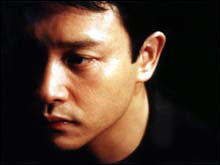 I’ve worked bloody hard for 20 years. I was penniless, dying hard for my groceries. I can now live in a reasonably sized detached house. I’m still very strong in Japan and Korea. But I may be a little passé in Hong Kong. The place is so extravagant, vulgar, expensive. I may be too soft for Hong Kong. I don’t always count myself as one of them.
I’ve worked bloody hard for 20 years. I was penniless, dying hard for my groceries. I can now live in a reasonably sized detached house. I’m still very strong in Japan and Korea. But I may be a little passé in Hong Kong. The place is so extravagant, vulgar, expensive. I may be too soft for Hong Kong. I don’t always count myself as one of them.
– Time-Asia Interview, April 2002
The economy has crashed, the political freedoms have diminished, the movie industry has declined. Hong Kong has moved on. You are old school, old hat, old news, a reminder of decadences no longer affordable or wanted. You still pack them in at concerts, but former comrades John Woo and Chow Yun-Fat have fled for Hollywood; directors Chen Kaige and Wong Kar Wai are no longer calling. Your post-Happy film career reads like an opium haze. In Double Tap (1999), you are a gun-toting psycho: nine parts mope and one part drama queen breakdown. In the To Catch a Thief-wannabe Okinawa Rendezvous (2000), given the opportunity to play off the likes of Faye Wong (Chungking Express) and Tony Leung Ka-Fai (The Lover), you sleepwalk. On and on, we hear reports of your depressions, your temper tantrums on set. Once Mercury, you are now the tired harridan.
And thus two empty years pass after Okinawa, as tabloids scream tales of permanent retirement, rocky times with your partner Daffy Tong – for you have officially come out, and even though everyone knew the truth, the mystery has vanished. But you have one last regeneration up your perfumed sleeve: a new album, a wildly successful concert tour, and a Sixth Sense ripoff, Inner Senses (2002), in which you find a new direction. You play a grounded, mature psychologist – rich irony for a man who breathed life into characters who would flee screaming from self-examination. And yet, in the modulations of your performance, we see the old Leslie, uncertain of living, haunted by ghosts – it is always ghosts with you, for a man out of time and step with the world is mere inches from being a ghost himself. The film concludes with you perched on a rooftop, driven to insanity, ready to jump. In the world of film and happy endings, you are granted a reprieve – a woman who loves you, faith dragging you from the brink. A heartfelt embrace, another dawn, another syrupy love song.
***
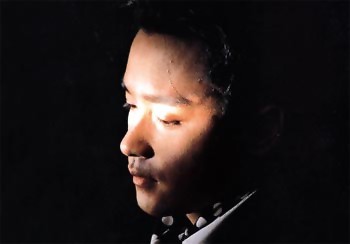 Depression.
Depression.
Thank you to all my friends, thank you to Professor Mak Lit Fei-Fei.
This year has been too tough, cannot stand it anymore.
Thank you Mr. Tong, thank you family, thank you Fei-Jeh.
I haven’t done anything bad in my life. Why does it end like this?
— Leslie Cheung’s Alleged Suicide Note
Hong Kong: April 1, 2003, 6:41 p.m.
A morbid thought perhaps, but I envision you preparing for that fatal dive off the 24th floor of the Mandarin Oriental Hotel with utmost concentration, bird-like grace. You have decided, for whatever reason, not to endure this world and what it awaits – wrinkles and thinning hairlines, the transition to respected – such an ugly word, respected – elder statesman, the wasting away.
Do you have any regrets when you jump? The Hong Kong press, as hysterical as ever, will conjure up numerous suicide scenarios. Was he on the verge of a break-up with Daffy? There will be whispers of sordid affairs, heated arguments. Or perhaps he was overtaken by ghosts and demons as a result of Inner Senses. You would have scoffed at these storylines. Too pat, too reductive. Perhaps it was all of the above. Perhaps the pendulum swung one final time, renewal giving away to inescapable despondence. We can only guess, and you would have appreciated that. Your parting gift is one more enigma, more raw material for the myth, immortality stretching out a little bit longer with every new bit of speculation.
Your long-time associate Kenneth, no surname, will say it best at your funeral with this message: My boss with irreplaceable splendor – forever you will be my bright little star. A different actor in a different movie said stars don’t fall out of the sky.
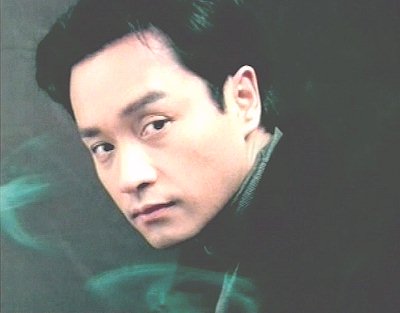 Nor are you eclipsed by moonlight. I choose to remember you by the film Moonlight Express (1999). It is a trifle of a movie, resplendent with cutesy Japanese actresses and a weightless love story … yet your sheer Leslie-ness shines through the noise. You are an undercover cop, a silky rebel with a cause. You are also a bereaved lover with a shot at redemption with a stranger. And most importantly, an apparition – for you are the spitting image of the stranger’s dead lover. We appreciate the subtext: you have been a ghost of our collective dreams all your life, the specter of what was, what should be. And thus I hold my breath when your character – exhausted, bruised, beautiful – regards himself in the mirror, unsure of what is real and phantasmal, seeking the answer to all his questions, for it is as if you are looking at yourself through us for the first time, bemused with your own magnetism. No vagaries of age, not a trace of smugness – only the watchful eyes of a dreamer who dares to dream a thousand dreams of you. If only you were looking at a mirror that evening, and saw what should have been so patently obvious, what we all saw.
Nor are you eclipsed by moonlight. I choose to remember you by the film Moonlight Express (1999). It is a trifle of a movie, resplendent with cutesy Japanese actresses and a weightless love story … yet your sheer Leslie-ness shines through the noise. You are an undercover cop, a silky rebel with a cause. You are also a bereaved lover with a shot at redemption with a stranger. And most importantly, an apparition – for you are the spitting image of the stranger’s dead lover. We appreciate the subtext: you have been a ghost of our collective dreams all your life, the specter of what was, what should be. And thus I hold my breath when your character – exhausted, bruised, beautiful – regards himself in the mirror, unsure of what is real and phantasmal, seeking the answer to all his questions, for it is as if you are looking at yourself through us for the first time, bemused with your own magnetism. No vagaries of age, not a trace of smugness – only the watchful eyes of a dreamer who dares to dream a thousand dreams of you. If only you were looking at a mirror that evening, and saw what should have been so patently obvious, what we all saw.
It is said your one regret is that you never had a chance to direct, but it is just as well. That face is meant to be before mirrors, before cameras. Forever.